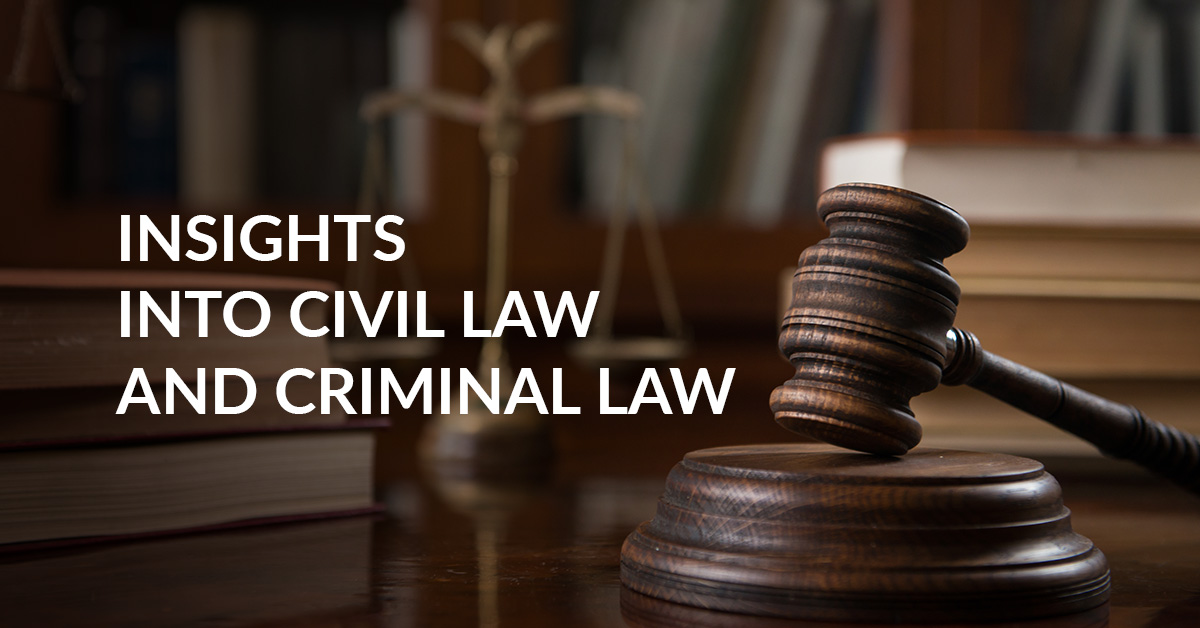
Civil and Criminal Cases – Understanding the Difference and Legal Significance
Introduction
The Indian legal system operates on the fundamental distinction between civil law and criminal law. While both branches aim to resolve disputes and uphold justice, their purpose, procedure, and consequences vary significantly. Civil cases primarily deal with disputes between individuals or organizations regarding rights, duties, or contracts, whereas criminal cases address acts considered harmful to society at large, with the objective of punishing wrongdoers and deterring crime.
For CLAT 2026 aspirants, this distinction is not just academic but also essential for understanding legal reasoning, procedural law, and judicial interpretations. Civil and criminal laws often intersect, creating complex scenarios where a single act may attract both civil and criminal liability. Recent interventions by the Supreme Court in disputes where High Courts allowed criminal proceedings to continue in what were essentially civil disputes highlight the relevance of this topic.
At CLAT Gurukul, the best online coaching for CLAT, we emphasize the importance of analyzing current legal developments to strengthen conceptual clarity. This topic is especially crucial for CLAT Current Affairs 2026, where aspirants must demonstrate their ability to connect ongoing judicial debates with foundational principles of law.
Why in News?
- Supreme Court Intervention – In the last two weeks (August 2025), the Supreme Court intervened twice in cases where High Courts allowed criminal proceedings in disputes that were essentially civil in nature.
- Case Example 1 (Rajasthan HC Case) – A couple faced criminal proceedings over an unpaid plywood consignment. The Supreme Court held that such matters fall under breach of trust in a sale transaction and should be treated as civil disputes, not criminal cases.
- Case Example 2 (Allahabad HC Case) – The SC stripped an order that had allowed criminal proceedings in a civil dispute involving an unpaid business transaction, emphasizing that criminal law should not be misapplied.
- Judicial Principle – The SC reiterated that civil disputes should not be given the color of criminal offences unless there is clear evidence of fraud or intention to cheat.
- Public Importance – These interventions underscore the boundary between civil wrongs and criminal offences, a matter directly relevant to law students, practitioners, and judicial reform.
Thus, the issue is in the news because the Supreme Court reaffirmed the importance of preventing misuse of criminal law in civil disputes, a principle with wide implications for justice delivery and legal education.
Point-wise Summary of the Article
- Distinction Between Civil and Criminal Law
- Civil Law: Resolves disputes between private individuals/organizations.
- Involves suits relating to contracts, property, family disputes, and torts.
- Relief is often monetary compensation or specific performance.
- Plaintiff files the case; defendant responds.
- Standard of proof: preponderance of probabilities (i.e., more likely to be true).
- Criminal Law: Deals with acts considered offences against the state or society.
- Objective is to punish and deter future crimes.
- State prosecutes the accused.
- Offences include theft, cheating, assault, and murder.
- Standard of proof: beyond reasonable doubt.
- Conviction may lead to imprisonment, fines, or even death penalty.
- Procedural Distinctions
- In civil cases, remedies are compensatory (monetary damages or injunctions).
- In criminal cases, remedies are punitive (imprisonment, fines, probation).
- Burden of proof is much higher in criminal law due to loss of liberty and social stigma.
- Overlapping Areas of Civil and Criminal Law
- Some acts can lead to both civil and criminal proceedings.
- Example: Breach of contract (civil wrong) combined with cheating and fraud (criminal offence).
- Courts often face the challenge of distinguishing legitimate civil disputes from cases where criminal liability is invoked unnecessarily.
- Judicial Concerns
- Misuse of criminal law in civil disputes burdens courts and violates individual liberty.
- The SC emphasized that judges should carefully evaluate whether the matter requires civil resolution or criminal prosecution.
- Length of Proceedings
- Common perception: Civil proceedings take longer than criminal trials.
- Data from National Judicial Data Grid (NJDG):
- 70.17% of criminal trials disposed of within a year.
- Only 37.91% of civil suits resolved in the same time.
- Execution Delays: Civil decrees often take years for enforcement.
- Example: Execution petition for civil order averages 4.91 years.
- Criminal cases average 3.97 years for disposal.
- Bail applications in criminal cases disposed within 1.62 months on average.
- Civil appeals/disputes often take longer – average 2.45 years for resolution.
- Practical Consequences
- Civil cases affect property, contracts, and financial disputes.
- Criminal cases involve life, liberty, and punishment.
- Parties in civil cases may drag proceedings, while criminal cases carry urgency due to fundamental rights at stake.
- Expert Insights
- Surya Prakash (DAKSH Program Director):
- Civil cases take longer due to complexity, but criminal trials have higher urgency.
- Shreya Tripathy (Vidhi Centre for Legal Policy):
- Difficulty in tracking execution timelines for civil cases.
- Appeals and overlapping procedures delay civil justice.
Notes – Peculiar Terms Explained
- Civil Case – A legal dispute between individuals or organizations concerning rights, duties, or liabilities (e.g., property disputes, contract breaches).
- Criminal Case – A case filed by the State against an individual for violating laws that harm society (e.g., murder, theft).
- Plaintiff – The person who files a civil case.
- Defendant – The person against whom the case is filed (civil or criminal).
- Prosecutor – The State representative who initiates criminal proceedings.
- Breach of Trust – Misuse of property or responsibility entrusted by another, leading to civil or criminal liability.
- Preponderance of Probabilities – Standard of proof in civil cases; whichever version of events is more probable is accepted.
- Beyond Reasonable Doubt – Higher standard of proof in criminal cases, requiring near certainty before conviction.
- Injunction – A court order requiring a person to do or refrain from doing something.
- Execution Petition – A legal process to enforce a civil court’s judgment or decree.
Analytical Context
- Importance for CLAT Aspirants
- Distinguishing civil and criminal law is vital for Legal Reasoning in CLAT.
- Many CLAT passages test the understanding of burden of proof, remedies, and judicial interpretation.
- Judicial Efficiency
- The data highlights systemic delays in civil justice, raising questions about reforms needed in execution proceedings.
- Criminal law, though faster in disposal, faces challenges of overcrowding in prisons and wrongful prosecutions.
- Rights and Liberties
- Criminal law directly affects fundamental rights (life and liberty under Article 21 of the Constitution).
- Civil disputes impact property rights, contractual obligations, and personal matters, reflecting Directive Principles and private law principles.
- Misuse of Criminal Law
- Using criminal law to pressurize civil defendants violates natural justice.
- The SC’s recent rulings reinforce the principle of proportionality in legal proceedings.
- Implications for Future Reforms
- Need for reforms in civil case management, execution of decrees, and alternate dispute resolution (ADR).
- Balancing efficiency with fairness remains a central concern.
Conclusion
The difference between civil and criminal law lies not only in procedural rules but also in philosophy and consequences. Civil law seeks to resolve disputes and provide remedies, while criminal law punishes offenders and protects society. The Supreme Court’s interventions in August 2025 reaffirm that criminal law should not be misused in civil disputes, ensuring fairness and protecting liberty.
For CLAT Current Affairs 2026, this case is a key example of how judicial interpretation preserves the boundary between civil and criminal liability. At CLAT Gurukul, the best online coaching for CLAT, we guide students to analyze such developments in depth, connecting them with broader principles of law, justice, and governance.
Ultimately, understanding the civil-criminal divide equips aspirants with both theoretical clarity and practical awareness — essential traits for future lawyers and policymakers.
This Blog is Powered by CLAT Gurukul — India’s Leading Law Entrance Prep Platform
At CLAT Gurukul, we believe in empowering future legal minds with the right blend of knowledge, strategy, and mentorship. This blog is a reflection of our commitment to quality content that not only helps aspirants stay updated but also sharpens their conceptual clarity.
Why CLAT Gurukul?
- Personalized Mentorship by Top Legal Educators
- Comprehensive Study Materials & Legal Updates
- Daily Practice Sets, Mocks & Performance Tracking
- Result-Oriented Strategy for CLAT, AILET, and CUET
Whether you’re reading this article to deepen your understanding or to stay ahead in your exam prep — you’re already one step closer with CLAT Gurukul by your side.
Join thousands of successful aspirants who trusted CLAT Gurukul and cracked India’s top law entrance exams.
Visit https://www.youtube.com/@CLATGurukul/shorts to learn more or speak to our experts now!
Note from CLAT Gurukul
At CLAT Gurukul, we are committed to providing free CLAT study material, including CLAT current affairs, legal reasoning practice sets, general knowledge updates, logical reasoning questions, English comprehension exercises, and more — all curated by top mentors.
Our blog section is regularly updated with high-quality CLAT content tailored to match the evolving pattern of the CLAT UG exam. Whether you’re looking for CLAT 2026 current affairs, CLAT legal reasoning passages, or mock practice sets, we have you covered.
We believe in open-access learning and will continue to publish free CLAT preparation resources to help serious aspirants succeed.
Explore more free content under categories like:
Best online coaching for CLAT, CLAT current affairs, CLAT GK updates, CLAT legal updates, CLAT logical reasoning, and CLAT English preparation.
For structured learning, daily mocks, and expert mentorship, visit https://www.youtube.com/@CLATGurukul/shorts — the Best CLAT Coaching in Patna and India’s most trusted platform for CLAT online coaching.




